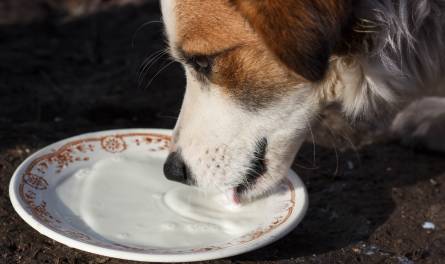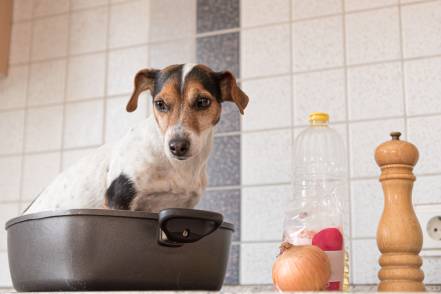Connect with a verified veterinarian in minutes. Licensed vets are available 24/7 to answer your questions. No need to worry about your furry family member.
Milk is a very popular drink all over the world! It’s used in many ways; for instance, milk can be poured on cereal, used in baking and cooking, or enjoyed with freshly baked cookies! Nothing’s better than a warm chocolate chip cookie and a cold glass of milk! Have you ever noticed your dog begging for milk? Can dogs even drink milk?
Has your dog drunk some milk? Are you worried the milk will make your dog sick? If so, then you’ve come to the right place. We understand it can be scary when your dog drinks something that maybe he shouldn’t. For this reason, we’ve put together some information to help you and your dog.
In this article, we’ll take a look at milk and whether or not it can make a dog sick. We’ll also share information on what to do if your dog has had milk. Just a note—this article is geared specifically to cow’s milk. Let’s get started!
What is Milk?
Cow’s milk is a wonderful drink that’s filled to overflowing with nutrients and great flavor. It’s produced for a cow’s young calf; however, many people love to drink milk, too. They enjoy the flavor and look to receive the health benefits that come with drinking milk.
Milk can do wonders to strengthen the immune system, and it’s filled to overflowing with nutrients that help make us strong and healthy. Milk is a rich source of:
- Calcium (great for strong bones & teeth)
- Riboflavin
- Phosphorous
- Vitamins A & B12
- Potassium
- Magnesium
- Zinc
While milk can be a healthy drink for many humans, what about dogs? Can dogs drink cow’s milk?
Milk & Dogs
The good news is that milk is not toxic to dogs. However, some dogs may have a problem after drinking milk. This is because some dogs are allergic to dairy products from cows, or they are lactose intolerant.
Lactose is a sugar that requires an enzyme called lactase to help break it down for digestion. Without this enzyme, dogs (and even humans) can get sick from the milk. Dogs who lack the enzyme lactase are called lactose intolerant.
Then there are dogs who are allergic to milk and other dairy products. These dogs will have an allergic reaction if they drink milk or ingest other dairy products.

Review symptoms, medications & behavior to keep your pets healthy with a Vet Online in just minutes.
Ask a Vet Live NowSymptoms of Lactose Intolerance in Dogs
- Diarrhea
- Bloating
- Constant gas
- Vomiting
- Abdominal pain
These symptoms can be severe in some dogs. What’s more, if diarrhea and other symptoms last longer than 24 hours, then it’s time to call the vet.
Symptoms of an Allergic Reaction to Milk in Dogs
Dogs who have an allergy to milk and other dairy products may show these symptoms:
- Red, itchy, irritated skin
- Excessive scratching & licking (from itching)
- Hot spots
- Diarrhea
- Gas
- Frequent bowel movements (loose stools, but not diarrhea)
- Vomiting
- Seizures
- Breathing difficulties
- And more
What to Do if Your Dog Has Drunk Milk
If your dog shows any of the signs of being lactose intolerant (especially with ongoing diarrhea, etc.) or shows signs of allergies, then it’s time to call the vet. Don’t wait to see if your fur baby’s symptoms will improve or worsen. Your dog needs help right away, especially for an allergic reaction.
Your vet is the best source of the next steps that are needed to help your dog. So, call the vet as soon as possible after your dog has drunk milk.
Connect with a verified veterinarian in minutes. Licensed vets are available 24/7 to answer your questions. No need to worry about your furry family member.

Tom
Tom has always loved to write since he was little - he wanted to be either a writer or a veterinary doctor, but he ended up being a professional writer while most of his works are based on animals. He was born in San Francisco but later moved to Texas to continue his job as a writer. He graduated from the University of San Francisco where he studied biotechnology. He is happily married and a soon to be father!
Review symptoms, medications & behavior to keep your pets healthy with a Vet Online in just minutes.
Ask a Vet Live Now




